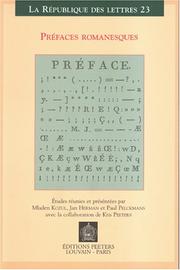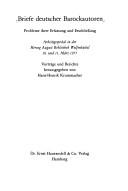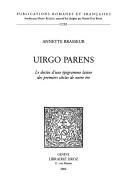| Listing 1 - 10 of 115 | << page >> |
Sort by
|
Periodical
Abstract | Keywords | Export | Availability | Bookmark
 Loading...
Loading...Choose an application
- Reference Manager
- EndNote
- RefWorks (Direct export to RefWorks)
Literature --- Writing --- History and criticism

ISBN: 9042915544 2877238385 9789042915541 9782877238380 Year: 2005 Volume: 23. Publisher: Louvain Peeters
Abstract | Keywords | Export | Availability | Bookmark
 Loading...
Loading...Choose an application
- Reference Manager
- EndNote
- RefWorks (Direct export to RefWorks)
French literature --- anno 1700-1799 --- anno 1800-1899 --- French fiction --- Prefaces --- Roman français --- Préfaces --- History and criticism. --- Histoire et critique --- History and criticism --- Roman français --- Préfaces --- French fiction - 18th century - History and criticism --- French fiction - 17th century - History and criticism --- Prefaces - History and criticism

ISBN: 3776201649 9783776201642 Year: 1978 Volume: 6 Publisher: Hamburg Hauswedell
Abstract | Keywords | Export | Availability | Bookmark
 Loading...
Loading...Choose an application
- Reference Manager
- EndNote
- RefWorks (Direct export to RefWorks)
German literature --- German letters --- History and criticism --- Congresses --- literature [humanities] --- German [culture or style] --- literature [discipline] --- German letters - History and criticism - Congresses --- German literature - Early modern, 1500-1700 - History and criticism - Congresses --- literary studies --- German [culture, style, period]

ISBN: 9782600010603 2600010602 Year: 2006 Volume: 240 Publisher: Genève Droz
Abstract | Keywords | Export | Availability | Bookmark
 Loading...
Loading...Choose an application
- Reference Manager
- EndNote
- RefWorks (Direct export to RefWorks)
L'épigramme latine Uirgo parens, qui eut - cette étude le montre - un réel succès durant de longs siècles, a aujourd'hui subi un sort bien injuste. Il est donc intéressant de la revisiter et de lui redonner son lustre. C'est à cette tâche que s'emploie Annette Brasseur en établissant l'édition complète de toutes les rédactions connues de l'épigramme, soigneusement replacées dans leur contexte et accompagnées de leur traduction, de commentaires historiques, littéraires, ainsi que d'index exhaustifs. Une réflexion doctrinale très profonde, brillante illustration de la foi en l'unité de Dieu et en la virginité de sa Mère, y est formulée avec beaucoup d'élégance. Tout en rendant palpable la dévotion des premières générations de chrétiens, elle ne peut manquer de retenir l'attention de nos contemporains que les grandes questions traitées dans ce texte n'ont pas fini de tourmenter. La part de mystère qui entoure encore son auteur (Grégoire le Grand, saint Jérôme, un certain Andreas Orator, un anonyme ?) fait le charme de sa lecture et lui donne un goût d'éternité.
Medieval Latin literature --- Epigrams, Latin --- Epigrammes latines --- History and criticism. --- Histoire et critique --- History and criticism --- 871-7 --- Latijnse literatuur: humor; satire --- 871-7 Latijnse literatuur: humor; satire --- Medieval Latin [language] --- epigrams --- Epigrams, Latin - History and criticism --- Maria Deipara
Book
ISBN: 9789004260771 Year: 2014 Volume: 29 Publisher: Leiden Brill
Abstract | Keywords | Export | Availability | Bookmark
 Loading...
Loading...Choose an application
- Reference Manager
- EndNote
- RefWorks (Direct export to RefWorks)
Comparative literature --- Classical literature --- Europe --- classics [discipline] --- comparative literature --- Literature, Classical --- Literature --- Literature, Ancient --- Greek literature --- Latin literature --- Appreciation --- History and criticism&delete& --- Theory, etc --- History and criticism
Book
ISBN: 9789004218567 9789004226371 9004226370 128342634X 9781283426343 9004218564 9786613426345 Year: 2012 Volume: 23 Publisher: Leiden Brill
Abstract | Keywords | Export | Availability | Bookmark
 Loading...
Loading...Choose an application
- Reference Manager
- EndNote
- RefWorks (Direct export to RefWorks)
The religious upheavals of the early modern period and the fierce debate they unleashed about true devotion gave conversion an unprecedented urgency. With their rich variety of emotive, aesthetic and rhetoric means of expression, literature and the visual arts proved particularly well-adapted means to address, explore and represent the complex nature of conversion. At the same time, many artists and authors experimented with the notion that the expressive character of their work could cultivate a sensory experience for the viewer that enacted conversion. Indeed, focusing on conversion as one of early modern Europe’s most pressing religious issues, this volume demonstrates that conversion cannot be separated from the creative and spiritual ways in which it was given meaning. Contributors include Mathilde Bernard, John R. Decker, Xander van Eck, Shulamit Furstenberg-Levi, Lise Gosseye, Chloë Houston, Philip Major, Walter Melion, Bart Ramakers, E. Natalie Rothman, Alison Searle, Lieke Stelling, Jayme Yeo, and Federico Zuliani.
Graphic arts --- Thematology --- History of civilization --- Iconography --- anno 1500-1799 --- Conversion in art. --- Conversion in literature. --- Literature, European --- History and criticism. --- iconography --- conversions [activity] --- Conversion in art --- Conversion in literature --- History and criticism --- European literature
Book
ISBN: 9789004236806 9789004236813 9004236813 9781283855013 1283855011 9004236805 Year: 2012 Volume: 217 Publisher: Leiden Brill
Abstract | Keywords | Export | Availability | Bookmark
 Loading...
Loading...Choose an application
- Reference Manager
- EndNote
- RefWorks (Direct export to RefWorks)
The present volume collects seventeen case studies that characterize the various kinds of translationes within European culture over the last two millennia. Intellectual identities establish themselves by means of a continuous translation and rethinking of previous meanings—a sequence of translations and transformations in the transmission of knowledge from one intellectual context to another. This book provides a view on a wide range of texts from ancient Greece to Rome, from the Medieval world to the Renaissance, indicating how the process of translatio studiorum evolves as a continuous transposition of texts, of the ways in which they are rewritten, their translations, interpretations and metamorphosis, all of which are crucial to a full understanding of intellectual history.
History of civilization --- Philosophy --- Philosophical literature --- Intellectual life --- Methodology. --- Philosophie --- Vie intellectuelle --- Méthodologie --- History. --- Documentation --- Histoire --- Méthodologie --- translations [documents] --- cultural diffusion --- Methodology --- Humanities literature --- Research --- Intellectual history --- History --- History and criticism --- Cultural life --- Culture --- History and criticism. --- Humanities Methodology
Book
ISBN: 3776201592 9783776201598 Year: 1977 Volume: 4 Publisher: Hamburg Hauswedell
Abstract | Keywords | Export | Availability | Bookmark
 Loading...
Loading...Choose an application
- Reference Manager
- EndNote
- RefWorks (Direct export to RefWorks)
German literature --- German literature: authors --- Country life in literature --- Pastoral literature, German --- Congresses --- History and criticism --- -German literature --- -Pastoral literature, German --- -German pastoral literature --- -Congresses --- literature [humanities] --- German [culture or style] --- German pastoral literature --- History and criticism&delete& --- literature [discipline] --- Country life in literature - Congresses --- German literature - Early modern, 1500-1700 - History and criticism --- Pastoral literature, German - History and criticism --- literary studies --- German [culture, style, period]
Book
ISBN: 3447041188 Year: 1998 Volume: 3 83 Publisher: Wiesbaden Harrassowitz
Abstract | Keywords | Export | Availability | Bookmark
 Loading...
Loading...Choose an application
- Reference Manager
- EndNote
- RefWorks (Direct export to RefWorks)
Book history --- Music --- anno 1400-1499 --- anno 1500-1599 --- 15th century --- Manuscripts --- 16th century --- 15th-16th centuries --- History and criticism
Periodical

ISSN: 20304919 Year: 1895 Publisher: Bruxelles Imprimerie Xavier Havermans
Abstract | Keywords | Export | Availability | Bookmark
 Loading...
Loading...Choose an application
- Reference Manager
- EndNote
- RefWorks (Direct export to RefWorks)
Revue littéraire fondée en mai 1895 et publiée jusqu'en 1897, Le Coq rouge est l'oeuvre d'un certain nombre de prosateurs dissidents de La Jeune Belgique, emmenés par Georges Eekhoud. Ils souhaitaient réagir à la définition trop restrictive de l'art pour l'art que défendaient à ce moment Albert Giraud et Ywan Gilkin. Participant à la Section d'art de la Maison du Peuple, d'orientation socialiste ou anarchiste, ils défendaient sinon l'art social, au moins l'art pour tous, mais également le vers libre, le théâtre symboliste ainsi qu'un certain réalisme dans le domaine romanesque. Plusieurs auteurs français majeurs y ont apporté leur collaboration (André Gide, Remy de Gourmont, etc.). En septembre 1896, Le Coq rouge fusionne brièvement avec L'Art jeune avant de disparaître en mars de l'année suivante (voir : Georges-Henri Dumont, "Quand le Coq rouge plantait ses ergots sur la Jeune Belgique (1895-1897)" [en ligne], Bruxelles, Académie royale de langue et de littérature françaises de Belgique, 1991.
French literature --- French poetry --- Littérature française --- Poésie française --- Authors, Belgian --- History and criticism --- Periodicals --- Ecrivains belges --- Histoire et critique --- Périodiques
| Listing 1 - 10 of 115 | << page >> |
Sort by
|

 Search
Search Feedback
Feedback About UniCat
About UniCat  Help
Help News
News